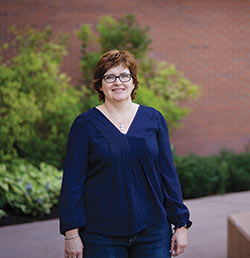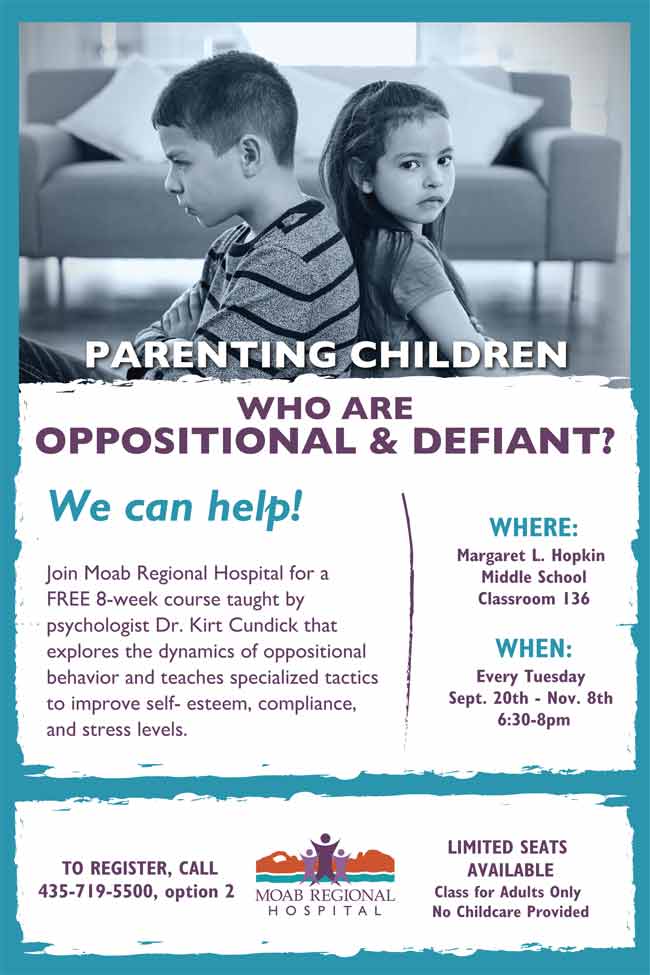|
|
University Happenings - September 2022 |
| USU Moab Adds CTE Coordinator
|
Utah State University Moab is pleased to announce the addition of Rachel Stenta to the campus staff. Stenta has been hired as a Career and Technical Education coordinator and began in August.
“I am truly thrilled to have Rachel onboard,” said Lianna Etchberger, Associate Vice President for USU Moab. “Rachel has strong ties and connections to this community and is a long-time resident and parent. She is passionate about technical education as a way to not only elevate our community through workforce training, but also as a means to expand career possibilities for folks.” 
In this role, Stenta will handle many of the day-to-day responsibilities associated with USU Moab’s CTE programs. With the opening of USU Moab’s new campus, the CTE programs will have expanded capacity and offer greater opportunities for the community, including now offering space for both construction and welding courses.
“I am very passionate about Career and Technical Education,” Stenta said. “Both of my brothers are automotive master mechanics. I’ve seen firsthand the opportunities and advantages that technical trades bring to people and communities. I’m very excited about this new role and am eager to serve and help Moab students, businesses and the community.”
Prior to joining USU, Stenta retired after more than 22 years working for the city of Moab, first as the City Recorder and Assistant City Manager and later as the city’s Financial Director. In these positions, Stenta was in charge of overseeing the city’s annual budget and has experience with accounting, project management, records management, IT systems management, web development and policy development. Stenta has more than 30 years of experience working with government and higher education agencies.
Stenta is a USU Moab alum, graduating in 2016 with a bachelor’s degree Business Management Information Systems. After doing a few semesters of colleges in the Salt Lake valley before moving to Moab, Stenta was excited to learn she could finish her degree via a Utah State University Statewide Campus close to where she now lived.
“I’ve been a proud Aggie for 27 years,” Stenta said. “I was thrilled I could continue working on my degree in Moab. I didn’t think it would be an option when I left Salt Lake City to live in rural Utah.”
Stenta is now happy to begin a new chapter of her career and to continue to affect change in Moab.
“I’m very excited to be a new part of the USU Moab team,” Stenta said. “I’m so eager to engage with our students, our schools, and our businesses to help improve lives and continue to grow a sustainable local workforce.”
Stenta grew up in a military family as the youngest of five children. She lived in seven states by the time she was 10. This allowed Stenta to learn how to adapt and accept to change. She and her family settled in Utah, where she has lived for more than 40 years. Stenta moved to Moab in 1994.
Stenta has two sons. Her son Evan attends USU full time in Logan, while her younger son Isaac is a senior at Grand County High School, who takes classes through USU Moab.
Stenta has already been working with Grand County School District CTE Director Cari Caylor to strengthen CTE pathways toward a seamless transition from high school to USU Moab and is working to help strengthen ties with the school district for future collaborations. USU Moab offers help for students looking to plan for life after high school. For more information on USU’s Technical Education programs, visit statewide.usu.edu/cte.
Located in the outdoor recreation paradise of Moab and boasting one of the greenest buildings on any USU campus, Utah State University Moab offers students the personalized attention and small class sizes of a small-town college with the resources of a large university. With programs such as Nursing, Elementary Education, Recreation Resource Management and Social Work, technical education in Health Professions, Automotive and Business, and degree options ranging from associate to doctorate degrees, USU Moab offers programs that help fuel local economies and empower individuals and their communities. Learn more at moab.usu.edu.
|
USU Moab Adds CTE Coordinator
by Dr. Kirt Cundick |
Oppositional children have an obvious problem and a not-so-obvious problem. The most vivid part of their difficulties is their defiant and confrontational behavior. The less obvious problem affecting these children is that they are growing up too fast, they are not functioning completely as children but, to one degree or another, are carrying adult emotional responsibilities.
- James Keim, LCSW
Every parent has experienced moments when nothing you do is going to be the right thing. I remember one of those moments. My daughter was about six and we were Christmas shopping at South Town Mall. It was crowded, we were all tired, and she was probably getting hungry. She discovered a Hello Kitty kiosk, and more particularly, a “Badtz Maru” stationary set: small paper pad, pencil, eraser, maybe some stickers, in a decorated clear plastic case and priced at (if memory serves) around fourteen dollars. When I refused to buy it for her she threw herself to the floor at my feet, sobbing loudly, and the entire mall—both levels—stopped and stared.
The definition of a “double-bind” in the world of psychology is that situation where there is a demand that you do something, but anything you do is going to be wrong. I knew that if I picked her up and carried her out, some folks would assume I was going to beat her. If I walked away, people would assume that I was a neglectful parent, “so no wonder she was acting that way”! What I did was step over her, and when she grabbed my foot, I dragged her about thirty feet while she loudly lamented. I don’t know what people thought of that, but none of it felt “right” to me. Such are the challenges of modern, public parenting.
When I worked in community mental health, we referred families to quality, empirically-validated parenting courses like “Love and Logic” or “Steps”. But there was a subset of families who would later state that those approaches did not work. Those parents noted their children did not respond well to reinforcements—that they would act-out when parents tried to do or give nice things to them. It seemed to defy the learning theory parenting programs usually tend to rely on.
Some colleagues of mine saw James Keim present at a state mental health conference. He runs a center for the treatment of Oppositional and Defiant Disorder. My colleagues were so excited about what they heard that they crafted a parenting curriculum specifically for those families for whom other approaches had not previously worked. When I rejoined that team, I also got excited, we added some things, and I’ve been teaching it since then.
Once you come to understand oppositional and defiant children, their actions start to make sense. When children and teens are struggling, there are two general paths they take in order to feel better: seeking out things that bolster their self-esteem, or withdrawing from things that challenge their self-concept. What oppositional and defiant children do is the latter; they use their behavior to undermine the credibility of people who point out their wrongdoings—particularly the people who they believe the most—their parents.
Despite what they are pretending, kids would not go to such lengths to undermine their parents’ credibility if they really did not care. They wouldn’t need to!
One of the perplexing difficulties faced is that kids cannot undermine someone’s feedback only when it is convenient; they cannot believe their parents’ opinion when their parents are complimenting them and then decide they don’t believe them when they feel criticized; it's all or nothing.
This leaves parents going to increasingly greater lengths to get their point across and get their kids to behave, and kids going to greater and greater lengths to dig their heels in. Over time these kids inevitably become discouraged and desperate. In an effort to avoid the things that make them feel bad about themselves, they're also avoiding the things that make them feel good. This is a dangerous spiral. You can help them pull out of it.
Join Moab Regional Hospital for a FREE parenting class, Parenting Oppositional and Defiant Children, taught by psychologist Dr. Kirt Cundick. The 8-week course will explore the dynamics of oppositional behavior and teach specialized tactics to improve self-esteem, compliance, and stress levels!. Tuesdays, September 20th – November 8th, 6:30-8:30pm. To register, call 435-719-5500, option 2.

|
|
|
|
|
|
|
© 2002-2024 Moab Happenings. All rights
reserved.
Reproduction of information contained in this site is
expressly prohibited.
|
|